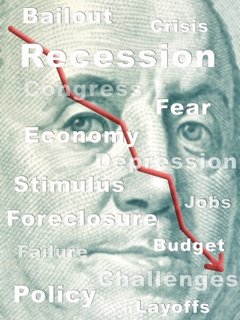Archive for 2009
Sunday, April 5th, 2009
 If you’re having trouble meeting mortgage payments, you certainly are not alone. If you’re having trouble meeting mortgage payments, you certainly are not alone.
The Mortgage Bankers Association recently reported that the national foreclosure rate is now at 3.3%, and over 11% of all mortgages are either delinquent or in the process of foreclosure.
Now, due to the state of the economy, even some homeowners who are still managing to keep up with payments are being tempted to abandon the mortgage and start over.
If you’ve been thinking of making that move, first consider what it will do to your credit rating.
A repossession on your credit report will instantly reduce your FICO score by at least 100 points – and it doesn’t matter if you walked away voluntarily or were forced out through foreclosure.
Worse, after a foreclosure, the lender can still come after you for any difference between what you owed and what they are able to gain through the eventual sale of the house.
For some, a better alternative is the short sale. In this case, the bank agrees to forgive that difference and mark your debt paid. If you’re very lucky, they will even report it to the credit bureau as “paid satisfactorily” so that it doesn’t damage your credit score. If they report it as “settled for less than the full amount due” your score will take a hit, just as if you’d gone through foreclosure.
The big benefit is that if this was your primary home and the forgiven debt was less than $1 million ($2 million for couples filing jointly) then you will not owe income tax on the forgiven debt. This, by the way, is a temporary tax law change and only affects debt incurred between 2007 and 2012.
A better alternative to either foreclosure or a short sale is negotiation. Lenders really don’t want to own houses. It costs money, and what they want is money coming in, not going out.
If you’re falling behind financially, contact your lender right away and work to negotiate a lower rate or other terms that will allow you to keep the house and stay afloat.
If you need help with these negotiations, you can get it – at no charge. The National Foundation for Credit Counseling recently got $16 million in federal funding to help troubled homeowners, and has trained counselors who will assist in negotiations.
HUD also has approved counselors in every state who don’t charge anything to help homeowners stay in their homes. To find a counselor in your state, go to http://www.hud.gov/foreclosure/local.cfm
Under the Homeowner Affordability and Stability Plan, the government is offering help to up to 9 million families so they can avoid foreclosure. So don’t wait – if you need help, ask for it.
Note* The National Foundation for Credit Counseling warns that it is not necessary to pay for help with your negotiations. Stay away from companies that offer to help for $500, $1,000, and even $1,500. Often these services are bogus – and they’re always available for free.
Author:Marte Cliff
CreditScoreQuick.com your resource for free credit reports, credit cards, loans, and ground breaking credit news
Posted in Uncategorized | Comments Off
Saturday, April 4th, 2009
 That depends upon the policies the card issuer has. American Express, for example, says they report new credit card accounts one billing cycle after the application was approved – regardless of whether the card was activated. That depends upon the policies the card issuer has. American Express, for example, says they report new credit card accounts one billing cycle after the application was approved – regardless of whether the card was activated.
Your application for the card will always show up – and will remain for 2 years. However, it will only be factored into your credit score for one year.
Once a credit card account has been approved and reported to FICO, it will show on your credit report as an active account until it is closed. Your non-use of the card is only considered as a part of your overall debt to available credit ratio.
Credit card Adviser Leslie McFadden at Bankrate.com advises that canceling a card after the issuer reports it could negatively affect your credit score. If you cancel before it is reported, it will have no affect.
Thus, if you made application for one card but received another – and you don’t want the card you were issued, you should cancel immediately. This is not unusual in today’s credit climate. Credit card issuers hoping to attract card holders with high FICO scores advertise low rates and high credit lines, but often issue cards bearing high rates and low credit lines after reviewing an application.
While this will upset you – it shouldn’t make you feel less worthy. Almost everyone is seeing their FICO scores decline due to the actions that card issuers are taking today.
Shrinking credit lines means card holders who once had a 30% debt to available credit ratio now have an 80 or 90% ratio. Closing unused accounts has the same effect. Card issuers are doing both, and it is affecting people who once had enviable FICO scores.
Should you receive a card in the mail that you know you didn’t ask for, and that isn’t merely a replacement of a card you carry that is expiring, you should contact the issuer immediately to cancel it.
You probably won’t be able to get much information over the phone about who initiated the request – or when or where. So your next step should be to order a copy of your credit report. That unsolicited card could be a sign of identity theft, so look for any other suspicious activity, especially signs that you have a new address or have made application for other credit.
Author:Marte Cliff
CreditScoreQuick.com your resource for free credit reports, credit cards, loans, and ground breaking credit news
Posted in credit cards | Comments Off
Thursday, April 2nd, 2009

I have heard so many negative stories and myths about Mortgage Brokers. This bad stigma that has been spread about brokers is very intriguing. Typically when you talk to a seasoned Realtors they will say just the opposite. Normally what you will hear from a Realtor is use a mortgage broker. I wanted to discuss some of the differences between a bank and a mortgage broker in this article.
Banks
You will find that most banks providing mortgage loans work with only good credit. This has been the case for years. Also with banks there is more red tape to get a loan done than with a mortgage broker. This is why most Realtors use a broker. Mortgage brokers have the ability the package loans better. In other words they know how to get the loan done so the loan can be sold on what is called the secondary market. Some banks don’t sell their loans, so they are extremely picky with how they underwrite loans that they portfolio. Don’t get me wrong, banks sell their loans on the secondary market also. Bottom line, banks are just pickier on their underwriting criteria. One advantage of banks is their underwriting fees are typically less, but not by much. This difference usually ranges between $300 to $500 dollars in cost to you. In some cases the banks fees are higher than brokers. This cost usually means the difference of getting approved or denied. So my question would be, is it worth the extra cost to have the loan go smoothly? I would have to say yes. Another disadvantage of Banks is if your loan runs into problems because the underwriter does not like something, you are stuck. A bank cannot broker the loan somewhere else to get a second opinion if they run into issues. This is the single biggest issue with Banks.
Brokers
I have found that most broker shops have the tendency to be more knowledgeable about loans. I believe the reason is Mortgage Broker’s are more motivated to get loans done properly because they make good money per loan. Money motivates anyone. Loan officers with banks make less on their loans, so I believe this promotes high turnover along with a lack of proper training. Also if a broker runs into issues typically they can repackage the loan and send it to another participating wholesale lender. These lenders range from big banks to small banks. In the world of underwriting every underwriter might view a file differently. This is the HUGE advantage of using a broker. There is no bigger disappointment than being told no on your dream house. So I recommend that you use a reputable mortgage broker in your area. Don’t get me wrong, there are some real bad mortgage brokers out there. So make sure you are working with a seasoned mortgage broker.
In regards to the differences in process, there really is not much difference. The underwriting guidelines for FHA and Conventional loans are pretty standard across the board for banks and Brokers. The main difference is flexibility to fix issues. As mentioned you can see that a Mortgage Broker might have more flexibility to get loans done and shop for better interest rates on your behalf. Author: Mike Clover
Posted in Uncategorized | 1 Comment »
Sunday, March 29th, 2009

With the mortgage credit score benchmark changing monthly, it’s really tough to keep up with what the requirements actually are. As the market changes like Texas weather, you can only assume you have a high enough credit score to even get a mortgage loan. This market has been extremely turbulent with all the new mortgage qualifying guideline. I wanted to give the current credit score requirements as of March 29, 2009 for FHA and Conventional loans.
FHA credit score Requirements- Most lenders are requiring that you have a 620 credit score to get a FHA mortgage loan. This benchmark has recently changed from a middle credit score of 580 to a 620 with most lenders. There might be circumstances out there where a lender will allow a loan below this benchmark if they don’t plan on selling there loans on the secondary market. I do know that you will find most lenders will require a 620 score to get you financed. I know this rule will be applied to all brokers, and not to all banks. So you might check around just to see if there is a bank allowing a credit score below 620 and what there guidelines are. Historically brokers have always been able to get loans done that banks cannot do. It looks like the tide might be changing a bit in this arena.
Conventional Loan credit score Requirements – Currently with most lenders you have to put down between 5 and 10%. You must also have a minimum of a 700 middle credit score to get financed. This is largely due to (Mortgage Insurance) M.I. companies clamping down on credit criteria to insure a loan. However there are some banks that get special privileges that other don’t. For example, some banks can now get you a Conventional loan with a credit score as low as 680 with 10% down. These M.I. companies have chosen to allow this with certain qualified banks. You will find that most lenders will require a minimum 700 credit score to get financed, and don’t forget you must qualify as well.
VA and USDA credit score requirements – These two loans are really the only loans left that are 100% financing still. They both are government insured loans and you must qualify for each program. Not everyone will qualify for either one of these government loans. The current market for these particular loans does require a middle credit score of 620. USDA has had this credit score requirement for quite some time now. So this is nothing new with this particular loan.
Posted in Uncategorized | 1 Comment »
Saturday, March 28th, 2009

What is going on in our country? We don’t want to offend anyone, or say anything that might hurt someone’s feelings. Wow, so I guess if you are wrong that is ok. I BEG to DIFFER. I think we need to spread the word that if you are wrong, then you are WRONG. I am not really concerned what everyone else thinks, the only person that really matters is what GOD thinks, not some politically correct person.
Let’s face the facts, when you are wrong about something it needs to be known. Whether it’s in regards to finance, political views, religion or just shop talk. There are right ways and wrong ways to doing things.
I wanted to take my real approach to views about what is really going on. I would like to call it the Back to Basics show. If you ever have a chance, listen to Mark Levin. This guy takes the correct approach to saving our Constitution, and telling the FACTS about what is really going on in our country.
Whether your credit stinks, or your political views are radical, I will tell you what is right.
Since my site is mainly about credit and finance, I will stick with the general content and topic of this article. If you currently are not RICH, your credit is more important than ever. I cannot imagine what your life will be like if you need a loan and cannot get one. With the lending institutions increasing credit score requirements and qualifications rules, you can count on your life being extremely tough with challenged credit. So the question is what do you do about it? Within my site I have all kinds of articles about what you need to do to manage your credit, or fix it. I get e-mails daily from people all around the U.S. thanking me for writing about the FACTS. You can go the http://www.ftc.gov/bcp/edu/pubs/consumer/credit/cre13.shtm and see that SELF Help credit repair is the recommendation by your own government. This should tell you something. There is no quick fix to getting your credit report cleaned up. Don’t fall prey to quick fix credit repair schemes. Use our site to help yourself out. I should know since I am a lender and help people out all the time that will listen. Search within our blog and find the article that fits your circumstances.
For once I am not going to be politically correct within my blog. So the point is, “If your credit stinks do something about it.” Don’t depend on some credit repair scam. This information provided today is for your own good. I don’t make any money by educating someone on how to repair their own credit report. I thought I would mention this. There are rules and steps you need to take in order to clean your mess up. Once these steps are understood teach them to your children. Help them; teach them to be responsible for their tomorrow.
In this country we have many freedoms. One of our freedoms is the pursuit of happiness. Now, how we get to this happiness is by what we feel is right and we seem to not follow good advice if the advice requires some effort. Repairing your credit requires effort on your part.
Posted in credit repair facts | Comments Off
Thursday, March 26th, 2009

If I had a dollar for every time I have heard this from some potential home buyer I would be a millionaire. I am not sure where this ignorance comes from, but just because you think you have the credit to buy a home does not mean you will “QUALIFY.” It does not matter what anyone thinks, I do know that there is a proper process to buying a house. I wanted to educate the common public on how important it is to listen to a real estate professional that has a good reputation. I know you have probably heard about all the nightmares about how someone had a horrible experience while buying there home. This typically is the result of the wrong process. Here are the FACTS.
Get approved to buy- The first step before you look at homes, drive around, search the web, etc….. is to get with a lender and get pre-approved. It does not matter what you think or how you feel this is your FIRST step. If you don’t do this first and you fall prey to a realtor willing to drive you around to look at homes, you will have problems. The rules for lending have currently changed. Obviously with the new lending guidelines it makes only rational sense to see what you can qualify for, before you have a Realtor show you a bunch of homes you may not be able to buy. I never have understood why Realtors run buyers out to show them homes without getting them pre-approved first. Usually when a realtor does this, it is lack of experience and bad judgment on there part. So, before you look at homes, get pre-approved. This means have a lender run your credit report, and verify ALL documentation supporting what you have told that lender. If a lender does not ask for documentation supporting your income, and funds to close, that lender is not following the proper process to get someone pre-approved. A lender should not pre-qualify you, but pre-approve you. There is a difference. Getting pre-approved means the lender has verified what you have told them. Pre-qualified means the lender has pulled your credit report, but has not verified your documentation. This is where lots of issues will arise. Again, “Get Pre Approved…..
Get with a reputable Realtor- Once you have got pre-approved get with a seasoned real estate agent. Real Estate agents that are seasoned will know how to make your buying process smooth. A good Realtor will know your local market and how to find exactly what you are approved to buy. One of the biggest misconceptions out there is “I don’t want to pay real estate fees. Well guess what? You will pay them regardless, because all homes for sale are listed with a agent. Yes, there are some for sale by owners, and 99% of the time those homes are overpriced, because the owner is not educated enough to know his or her own market. So with this being said, you will need a Realtor to represent you.
I hope this article did not sound like I was shouting. I just see so many people not listening. I can only lead a horse to water, but I cannot make him drink.
Posted in Uncategorized | 1 Comment »
Wednesday, March 25th, 2009
 Consumers with no credit history – and those who are trying to rebuild credit after experiencing financial difficulties – often find it nearly impossible to get that first loan or credit card to begin building a good credit score. Consumers with no credit history – and those who are trying to rebuild credit after experiencing financial difficulties – often find it nearly impossible to get that first loan or credit card to begin building a good credit score.
Unless you have a credit record to show that you’re a responsible debt payer, no one wants to give you credit. It gets even worse if you’ve got a past record of non-payment. And if you need to show responsible use of credit in order to get credit, it feels like you’re stuck between a rock and a hard place.
If you find yourself in this situation, you may feel very alone, but you’re not. It turns out that over 50 million Americans have little or no credit history. And millions more have a credit history that needs to be repaired.
The good news for you is that a company called Pay Rent Build Credit, Inc. (PRBC) is offering a solution. Called America’s Alternative Credit Bureau, they’ll help you build credit for bills you’ve already paid, even though those bills are typically not reported to traditional credit bureaus.
These are monthly expenses such as rent, telephone bills, insurance bills, cable and satellite TV bills, power bills, and even day care expenses. Typically, these are only reported to credit bureaus if your payments are late or in default.
For a small fee, PRBC, using information you supply, will verify your past payment of these accounts. Then, if you sign up through them for on-line bill pay, they’ll keep an ongoing record of payments.
Creditors with whom you’d like to do business can then request copies of your PRBC credit report - just the same way they request a credit report through any of the “Big 3″ Credit Bureaus. The difference is that you must first give permission.
Once you’ve shown a good record of payment of rent and 3 other bills for 12 months or more, a PRBC credit report can even help you qualify for a mortgage loan. In the meantime, it can help you get a credit card – or a better rate on a credit card, and can prove to a potential landlord or employer that you are a responsible consumer.
Often, consumers who have made a life-long habit of paying cash for every purchase are shocked and angered to find that they don’t qualify for a mortgage loan. They feel that they’re being penalized for responsible behavior – and they are. Mortgage companies, along with other credit issuers, want to see a track record of monthly payments. PRBC is helping those consumers prove that they are indeed credit worthy citizens.
Because the size of this market offers vast opportunities for profit, several other companies – including Fair Isssac – are either implementing or working on plans to implement some version of an alternative credit reporting service.
Author:Marte Cliff
Posted in building credit | Comments Off
Tuesday, March 24th, 2009

You’ve been told many times that it isn’t smart to let a salesperson check your credit unless you’re ready to make a purchase. In fact, you may have been told that credit checks are so damaging to your score that you don’t even dare look at your own credit report.
That part isn’t true. You can check your own credit report as often as you like with no damage to your score. And you should – it’s one way that you can be alerted quickly if someone else is using your identity.
In addition, you don’t need to worry the checks that credit card companies make before they send you one of those “pre-approved” offers. Not that you’ll be receiving many of those in the near future – credit card companies are trying not to extend credit right now – not searching for new borrowers.
Those checks, which are really nothing more than unauthorized snooping, are not used in compiling your score. They, along with account reviews and inquiries from potential employers, are known as “soft” inquiries.
The inquiries that affect your FICO score are the “hard inquiries.” These are made when you apply for retail store credit, credit cards, auto loans, and mortgages. They affect your score because they show your positive intent to obtain credit.
The more inquiries, the more they’ll affect your score – except in one instance. The credit bureaus and FICO understand that people shop for the best deals, and they take that into consideration.
So if you’re shopping for a car and you visit 6 different dealerships within a 2 week time frame, all 6 inquires will count as one under the old scoring model. The new model extends that time frame even farther – to 45 days.
The same is true for mortgage loan inquiries.
Even better for shoppers – any inquiries younger than 30 days are completely ignored by the scores. This gives you more leeway to shop for the best mortgage or car loan without fear of lowering your score.
Credit inquiries stay on your credit report for 2 years, but the FICO scoring model only counts them during the first year.
If you’re thinking about a car or a house, check your own credit first and work to get it into the upper 700′s before you let any lender do a hard inquiry. And then, don’t get the inquiry until you feel certain you’re ready to go forward.
It would be a shame to knock yourself down if you’ve been working hard to get to that place in life where lenders offer you the lowest rates!
Author: Mike Clover
CreditScoreQuick.com your resource for free credit reports, credit cards, loans, and ground breaking credit news.
Posted in credit check | Comments Off
Monday, March 23rd, 2009
 Not too many months ago, most consumers’ mailboxes were filled on an almost daily basis with offers for new credit cards. Most of them were emblazoned with “You’re approved” in bright red letters across the front as an enticement to open the envelope and say “yes” to the opportunity. Not too many months ago, most consumers’ mailboxes were filled on an almost daily basis with offers for new credit cards. Most of them were emblazoned with “You’re approved” in bright red letters across the front as an enticement to open the envelope and say “yes” to the opportunity.
Along with those offers were envelopes filled with cash advance checks from current card issuers. Some of them were already printed out in amounts of $3,000, $5,000, or even more. The message was clear: “Just sign the check and deposit – and go indulge your every whim!”
Often those messages came with enticements such as free gifts, reward programs, and interest-free trial periods. But that was last year.
Now, that deluge has slowed to a drip – and it only lands in selected citizen’s mailboxes.
Instead of seeking new card holders, credit card companies are closing unused accounts, slashing credit limits, and raising interest rates so high that most consumers can hardly wait to pay their debts and get out from under.
American Express, while also using those tactics, has taken an additional step: They’re offering significant “bribes” to current account holders to pay off their balance and close their accounts.
American Express isn’t revealing how many consumers received the letters offering them a $300 pre-paid credit card in exchange for paying off their accounts between March 1 and April 30.
Although other card issuers, such as Chase, offer similar (smaller) bribes to customers in default, American Express is targeting those customers who might go into default. One or more of the various scores kept on each of us has indicated that they’re a higher than average risk.
This is just one more step being taken by card issuers who are seeing near record numbers of defaults and charge-offs.
The result for consumers is anything but good. Low interest rates on both credit cards and mortgages require high credit scores. High credit scores rely on many factors – one of which is the ratio of debt to available credit. So every time a card issuer closes an account or reduces a credit line, the consumer’s credit score takes a hit.
This is a self-perpetuating cycle with no end in sight as yet. Hopefully the credit bureaus will begin taking notice and adjusting scores accordingly. However, there’s been no news of that happening.
One has to wonder – when the credit card companies “weed out” all those consumers who have been carrying balances and paying interest, they’ll be left with those who pay their balances in full each month. That will cost them money, so the next logical step will be to begin closing those accounts as well.
Then where will their income come from?
Author: Mike Clover
Posted in credit card | Comments Off
Sunday, March 22nd, 2009

Teaching your kids to understand and respect credit could be one of the most valuable lessons you can impart. People all around you are buried in debt – you may even be buried in debt. If you can keep your children from falling into the same trap, you’ll be doing them a great service.
You really need to start when they’re very young – with savings accounts, or even a box at home where they can save up money to buy something special. As they get a bit older and proficient at math, they should learn about checking accounts and how to track expenditures. They should also learn how to balance the bank account.
Learning those things early on will make them much less apt to go crazy with spending the first time they hold a piece of plastic with their own name embossed on the front.
If you didn’t start early, there’s no better time than now. They need to understand the basics before they have access to plastic money. That said, when the time is right, you have choices in how you’ll introduce him or her to the world of credit.
A simple way is to add your child’s name as an authorized user on your own card. As long as your credit is good, it will help your child to build credit as well. But that might not be the best choice.
If you add your child’s name to a card on which you carry a balance, the lesson may be lost. It’s better if the card your child uses is used for nothing but his or her expenses. That way you can both see and track purchases, and your child can see clearly how many dollars it costs when that balance isn’t paid in full each month. This is part of the lesson you want to teach.
If your teen has an “I can’t live without this item” and wants to charge it, you should first sit down together and go over the real cost. If the item is $100 and he or she can only pay $10 per month – show him how much extra he’ll pay in interest.
This is a good time to teach budgeting, so your child can see that if he runs up debt he’ll have that much less to spend next month.
You also need to establish some clear rules about how the card will be used. Will he buy his lunch every day with the card and then pay it off in full at the end of the month? Is the card for clothing, music, or entertainment? If so, who pays the bill? And what are the consequences for not making the payment – or not making it on time?
A second method is to help your child get his or her own card. You will probably have to co-sign, however. That means you will still be liable for the debt and your own credit will suffer if bills aren’t paid on time.
Both of these methods leave you open to “spoiling” the lessons. Because you won’t want a late payment on your credit report, you will probably jump in and bail out your child if he or she gets in a mess. And as we know, being rescued from our mistakes isn’t the way to learn lessons.
Stored-value cards are another option for helping kids learn how to handle money. These are actually pre-paid cards, so have no value in building a credit report. They’re convenient, because in most cases, your teen can have their paycheck deposited directly into the card.
Stored value cards are really the same thing as a checking account – except plastic.
Several banks are offering stored value cards, but they come with a big drawback: Almost every action – such as an enrollment, a reloading deposit or a balance inquiry – comes with a fee. There’s even a fee for inactivity if you don’t use the card for a few months.
It might be safer to set up a checking account. But if you choose that route, take the time to explain the consequences of writing a check for more than your available balance.
Posted in credit education | Comments Off
Disclaimer: This information has been compiled and provided by CreditScoreQuick.com as an informational service to the public. While our goal is to provide information that will help consumers to manage their credit and debt, this information should not be considered legal advice. Such advice must be specific to the various circumstances of each person's situation, and the general information provided on these pages should not be used as a substitute for the advice of competent legal counsel.

|
 If you’re having trouble meeting mortgage payments, you certainly are not alone.
If you’re having trouble meeting mortgage payments, you certainly are not alone.











